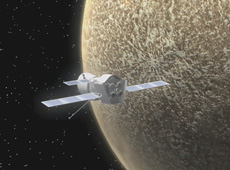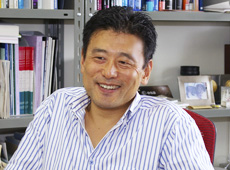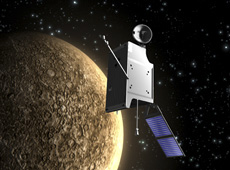Q. What is the significance of exploring another planet in the Solar System?

Coupled MMO and MPO, right before injection into the orbit of Mercury (Courtesy of ESA)
"I want to go somewhere I've never been before" or "I want to see a different world" are examples of the curious nature of humans. I believe this inquisitiveness can be extended to planetary exploration, although, of course, if you want to visit an unknown world, you can't simply go. So many researchers and engineers have been working hard on the BepiColombo mission. As we speak, these people are trying their best to complete this mission successfully. I think their efforts will create a lot of good. I also believe that making an effort to stimulate your curiosity is part of human nature, so I'd like to put my efforts into keeping this part of our personality vibrant.
Q. Have you been interested in space since you were a child?
When I was a child, I used to play soccer all the time. I was interested in how things work in general, but not space specifically. But then I realized that space is a very useful venue to figure out how everything works, because many strange things happen there. My original specialty was computer simulation of space phenomena. Specifically, I'm interested in the phenomena created by the gases that fill space.
Q. What's your goal for the future?

I would like to use these planetary explorations to show the role magnetic fields play in space phenomena, and to give the general public a sense of their importance. For example, just like you need to think about hydrodynamics when you design a car, when you think about space, you should first think about magnetic fields. My main goal is to let the world be convinced about the importance of magnetic fields, so that it becomes common knowledge.
Magnetic fields have the ability to pull things together from different places - that's called tension. This ability might be important in the process of planet formation, where dust gathers around a forming star. Magnetic fields have a specific ability to accumulate energy silently, and to cause an onset of explosion, such as aurora breakups. These peculiar abilities of magnetic field might be deeply related to the current existence of our planetary system, or to dynamic activities in space. I'd like to prove that magnetic fields are in fact a basic constituent of space. My dream is to see such data published in middle-school textbooks.
I would also like to make greater contributions, such as helping to spread "space culture" encouraging younger generations to enter the field, and creating an atmosphere that promotes international cooperation in space sciences. I think space exploration can inspire human curiosity, so with this in mind, in the future I hope to be devising new space exploration missions.
Professor of Space Plasma Physics at the Institute of Space and Astronautical Science, JAXA.
Dr. Fujimoto received his Ph.D. from the Department of Earth and Planetary Physics at the School of Science, University of Tokyo, in 1992, and became an assistant at the School of Science, Nagoya University. In 1996, he was appointed assistant professor at the Department of Earth and Planetary Sciences at the Graduate School of the Tokyo Institute of Technology. He has served in his current post since 2006. To date, Dr. Fujimoto has been involved in the Geotail project, which is studying the Earth's magnetosphere, the lunar exploration mission Kaguya, and others. Currently, he is working on the Mercury Exploration Mission BepiColombo, the Earth Magnetosphere Exploration Mission SCOPE, and a future mission to Jupiter. His specialties are space plasma physics and planetary system formation theories.
| Related Link: | Mercury Exploration Mission BepiColombo Investigating the Origins and Evolution of Earth by Exploring Mercury |
Japan and Europe Explore the Mysterious World of Mercury
Space Yacht: using sunlight to cruise through space
